(2019)
I’ve run two surveys that focused on Mx in the past. One was in 2014 and had 118 responses, and the other was in 2016 and had 505 responses.
This one ran from 5th until 19th January 2019, and there were 3,204 responses, of which 3,179 were usable, meaning I deleted 25 responses that were abusive or obviously duplicates. Of the 3,179 that were usable, 579 were in the UK. (I single out the UK here because I’m in the UK and I’m particularly interested in collecting UK-specific data.)
The survey was promoted on Tumblr, Twitter, Mastodon, and /r/samplesize on Reddit. The promotional text that I wrote didn’t mention the title Mx at all, in an attempt to get more diverse points of view into the results.
Ultimately my goal was to find out how people are pronouncing Mx these days. I ran the first Mx pronunciation survey in 2014 because I kept seeing people condemning Mx on the basis of not knowing how to pronounce it, so I thought information about how it is most commonly pronounced might help. I’m curious to see if over time people are asking that question less and whether one pronunciation is becoming more popular than others.
Plus I figured it might be interesting to find out a bunch of other stuff along the way while I’m there quizzing you all anyway, so I collected information about:
- Where people were raised and with which first spoken languages (so that people can compare the responses to all the other questions to this information and find out, for example, how Mx is pronounced in Australia or how often it’s on forms in the US vs. the UK);
- Gender;
- Whether Mx is your title or you’ve just heard of it;
- How often you see Mx on forms;
- Whether you think it’s gender-inclusive (anyone can use it) or gender-exclusive (nonbinary-specific title).
You can see the spreadsheet of responses and the associated tables and graphs here.
Familiarity with Mx
Here’s the ten countries whose participants are most familiar with Mx:
- United Kingdom: 85.5%
- France: 71.7% *
- Australia: 71.6%
- Finland: 70.4% *
- Germany: 66.4%
- United States: 65.9%
- Ireland {Republic}: 65.5% *
- Sweden: 61.8% *
- Canada: 60.9%
- Netherlands: 40.8% *
All countries had at least 27 responses. Countries with more than 100 responses are in bold, and countries with less than 100 responses are marked with an asterisk (*).
So at first I was like, “whaaaat, how is France more familiar with Mx than the US, even though the main language of France isn’t even English?” But France had only 53 respondents, compared to over 1,500 from the US, so I imagine there is some bias involved. People filling in the survey will notice that a lot of the questions are about Mx, and when at the end of the survey they’re prompted to share the survey URL they are more likely to do so if their title is Mx or they have friends whose titles are Mx.
So then I moved onto which participants had seen Mx on forms, and which countries they were from. Here’s the top 10 for “participants have seen Mx on English forms in the wild”:
- United Kingdom: 36.7%
- Ireland {Republic}: 21.7% *
- Netherlands: 20.0% *
- Canada: 18.0%
- Australia: 17.0%
- United States: 15.4%
- Germany: 10.6%
- Finland: 9.5% *
- France: 7.3% *
- Sweden: 4.5% *
Again, bold means over 100 participants from that country, and the asterisk (*) specifies that a country had under 100 respondents.
Someone from Australia said in the feedback box that Mx is on every government form, which I thought was excellent! It may not be surprising, since they were the first country to grant a passport with an X gender marker on it to someone who couldn’t be categorised as M or F, way back in 2011.
Pronunciation
I guess the thing you’re most interested in here is the way most people pronounce it, right? If you answered an earlier question by saying that you had heard of Mx, this question asked: “How do you personally pronounce Mx when you’re speaking English?”
For this question it was possible to select multiple answers, and there was an “other” textbox. None of the “others” got more entries than the least chosen pre-written option (Mixture, 4, or 0.2%).
- Mix: 25.5% (573 people)
- Məx, with a schwa (ə, toneless vowel): 9.5%
- I don’t know: 8.0%
- Em Ecks, spelling out M-X: 3.9%
- Mux: 2.7%
- Mex: 2.3%
- Mixter: 1.1%
- Mixture: 0.2%
In the UK the pronunciation varied from this significantly – Məx (the schwa option) was in the lead with 41%, though this percentage is lower than both previous surveys.
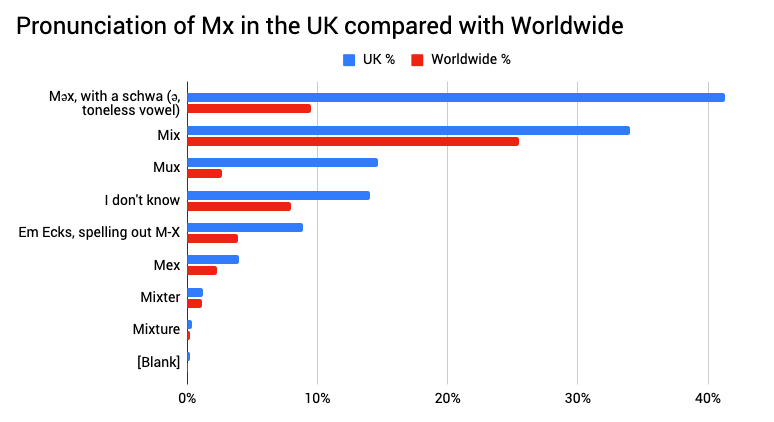
The spreadsheet goes into more detail on pronunciation, including chart for pronunciation in the 10 most popular first spoken languages, but to summarise: In the US go with Mix, and in the UK go with Məx (with a schwa).
This is the biggest survey I’ve seen on the pronunciation of Mx in the UK at least, with 506 participants in the UK taking part who had heard of the title, so this is probably the best we have to go on right now.
Mx and gender
I did ask about gender in this survey, in quite a roundabout way. I wanted to group people into roughly three groups, while also acknowledging that gender is ridiculous and a lot of people who’d be categorised as cis and binary wouldn’t necessarily feel 100% their gender all the time.
Which of these statements is most true for you?
- I’m a man/boy pretty much all the time
- I’m a woman/girl pretty much all the time
- Neither of the above options fully describes me
It was possible to check more than one box for this question, and several people did.
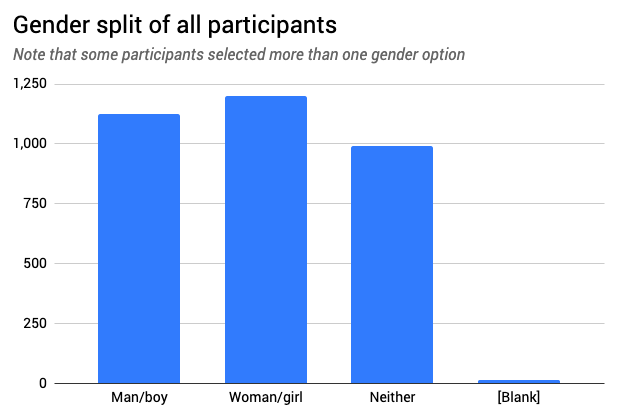
I then made a few comparisons between gender and other answers.
So we have some obvious details first. For example, of the people who said their title is always Mx, most people checked the “neither of the above” option (89%). And then there were more interesting details, such as that women and girls were significantly more likely than men and boys to use Mx for themselves “sometimes”. Could this be related to a few comments entered into the feedback box expressing discomfort with Mx because it sounds too much like Miss?
I learned that people who checked the “neither of the above” option for gender were the gender group most likely to have heard of Mx at 94%, and men/boys were least likely. Of the people who had not heard of Mx, men and boys made up over half. I’d love to suggest that men and boys are least likely to have heard of Mx in part because their privilege permits more obliviosity, but that would be pure speculation and possibly impure judgemental attitude and nothing more.
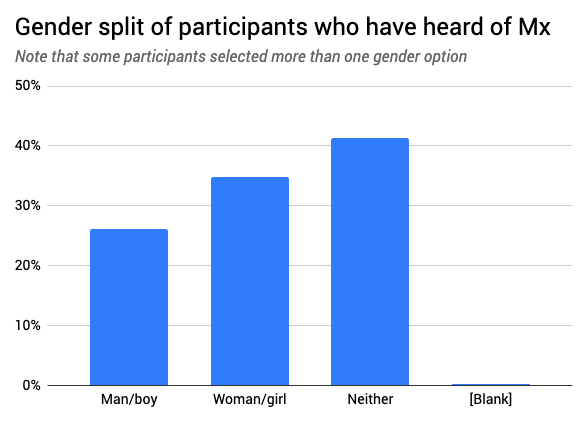
Inclusive vs. exclusive
I asked participants whether they thought Mx was gender-inclusive (anyone of any gender can claim it) or gender-exclusive (generally used when addressing or referring to someone of a particular gender, denoting that gender).
Do you consider Mx to be a title that is gender-inclusive or gender-exclusive, generally speaking?
- Gender-inclusive – anyone of any gender can claim it for themselves
- Gender-exclusive – it’s broadly a title for nonbinary people, in the same way that Mr is broadly a title for men and masculine people and Ms is a title for women and feminine people
- I don’t know
People whose titles were not Mx considered it to be a nonbinary title by a wide margin, but people whose titles were Mx considered it to be inclusive. This is interesting compared to several of the comments written into the feedback box, which I would paraphrase and roughly generalise into the following:
- I’m cisgender and binary and I would really like to have a title that doesn’t express a gender, but I’m scared that it’s a nonbinary title and I don’t want to take it away from nonbinary people.
- I’m nonbinary and my title is Mx and I wish some binary people would start using it because I would really like to be able to have a title that doesn’t cause dysphoria but also doesn’t out me as nonbinary.
That’s going entirely on what was typed into the feedback box, of course. There were many other diverse points of view, this was just a pattern that I saw while browsing. It’s possible that other comments were entered elsewhere in the form that I didn’t pick up on, too.
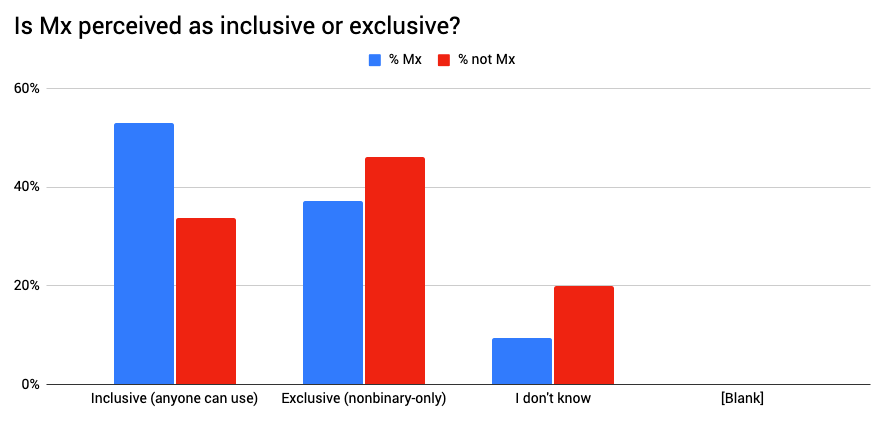
It might be interesting to note that of the people who only said they were men/boys, 14% said their title was sometimes or always Mx. For women/girls it’s 15%. Because of other biases I’ve mentioned above this is probably not representative of the general public, but it shows that binary people are using Mx for themselves in a gender-inclusive way, and over half of people who claim Mx think of it as an inclusive title, the most popular combination on this board:

When you split the inclusive/exclusive vote by nonbinary/binary participants instead of people claiming Mx, the results are much closer:
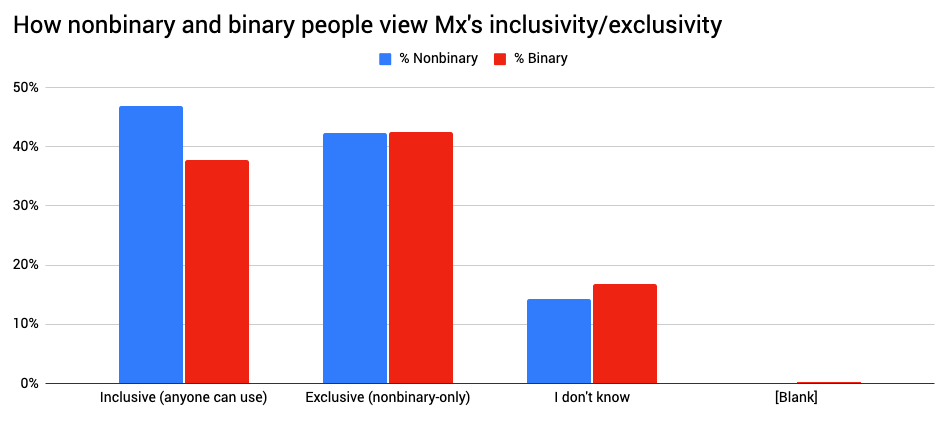
But again, nonbinary people are more likely to see the title as inclusive and less likely to see it as exclusive.
Notes
In most surveys I usually just ask whether or not someone lives in the UK, but this time I tried asking which country people lived in as a sort of experiment. I’m interested in collecting country-specific data for the much bigger annual survey, and I wanted to see how things might work out on a larger scale.
My hope was that enthusiastic people in other countries might be able to use the data specifically about their own country for their own cunning ends.
What I found was that lots of people said “I actually live in [location] but it wasn’t on the list” when [location] was a territory of another country that is probably culturally and linguistically very different from the governing nation. There were also a lot of people who complained about having to scroll too much to find their country (and language) on the list, so I’m sure there were many people who started to fill in the survey but then gave up and left no feedback.
The most popular country by a long way was the US with 49.6% of responses (1,567), and after that the number of people per country dwindled fast. Number 10 on the list, Finland, had only 27 responses (0.8%).
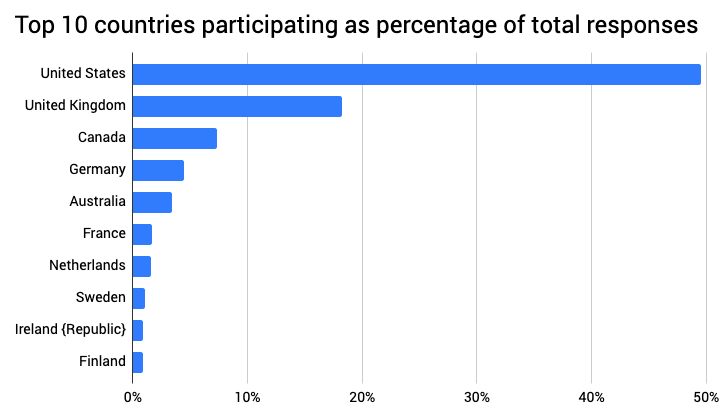
I think I will omit this question in the annual survey, and stick to “UK or not UK?”
Conclusion
Mx is pronounced Mix or Məx, with a schwa.
More nonbinary people use it than men or women, but there are binary men and women using Mx in a gender-inclusive way and most people whose titles are Mx are pretty okay with that actually.
The UK are totally winning at adoption of and familiarity with Mx, followed by (eyeballing it) Australia and the Republic of Ireland.
Nonbinary people and people whose title is Mx are both more likely to consider the title to be gender-inclusive, open to anyone who wants to use it regardless of gender identity.
Closing comments
Thank you everyone! Thank you for your honest and open answers, thank you for the interesting and helpful feedback comments (shoutout to the sweethearts who commented just to remind me to take regular breaks and to thank me for my hard work, ilu), and thank you for helping to boost the signal and get as many eyes on the survey form as possible. Without you, my survey and spreadsheet obsession would be 95.36% more boring. <3
So, this was kind of a warm-up. The past few weeks have been intense, and more intensity is coming, but I feel a bit more prepared for starting the 2019 survey. Hopefully I’ll be able to get started in a few weeks. Stay tuned…
2019-01-19
email: hello@gendercensus.com